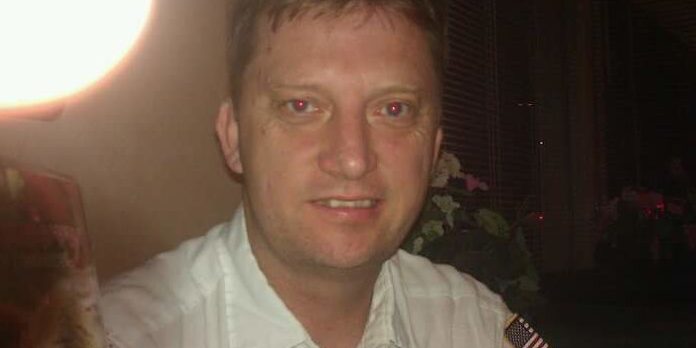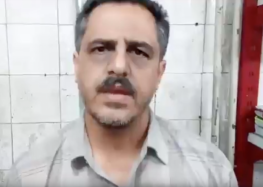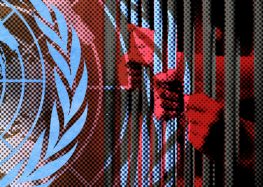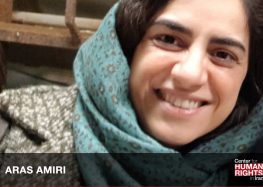Interview: Jailed Navy Vet Repeatedly Taken to Court Without Lawyer or Translator

Michael White Sentenced to 10 Years Imprisonment
US Navy veteran Michael White was repeatedly taken to court in Iran without an attorney or a translator before he was sentenced to 10 years imprisonment in March 2019, a family representative told the Center for Human Rights in Iran (CHRI).
During an April 3 interview, the family’s rep Jonathan Franks informed CHRI that White was only given access to a court-appointed lawyer who did not speak English and a translator during his last court appearances, when he was convicted of “insulting the supreme leader” and “posting a private photo on social media.”
White, 46, has also not been allowed direct contact with his family since his arrest in late July 2018. He is currently held in Vakilabad Prison in the city of Mashhad.
On March 11, Mashhad Prosecutor Gholamali Sadeghi claimed there were private and public plaintiffs against White but did not provide details. His family continues to campaign for his release.
Excerpts of the interview follow.
CHRI: What charges is Mr. White facing?
Franks: There are two charges. One seems to be related to him posting a photo of the Iranian woman he went to visit in Mashhad. We believe we have the picture they are talking about. It was published on Instagram. I don’t exactly know how one could conclude that that picture is criminal but apparently they have. We are not clear on the basis for the charge that he has “insulted the leader.” We know what the charges are and what the sentence is. We don’t know what evidence they claim to have or what facts justified these charges.
CHRI: Could you describe the Instagram photo?
Franks: They were both fully clothed sitting on what appears to be an outdoor bench together. It’s just a picture of the two of them together, which is why we are confused about what was indecent about the picture.
CHRI: Are you sure the charge against him was based on this photo?
Franks: We think it was the Instagram photo. The charge says “posting a private photo on social media.” So we think we know what social media accounts he had and there’s nothing indecent on any of them.
CHRI: Which court issued the verdict?
Franks: We don’t know. It was not the revolutionary court. It appears to be a normal court in the city of Mashhad. We have not received a copy of the verdict so we don’t know much about the process. We know he was taken to court approximately four times. Most of those times were without a translator or an attorney. It was only in the last appearance or two that they provided a translator and also an attorney who did not speak English.
Keep in mind we are relying on details provided by Michael in a prison setting with a Ministry of Intelligence agent standing over him telling him what he can and cannot say to the Swiss diplomats [Switzerland represents US interests in Iran]. So he reported being taken to court in the first instance at least twice without an attorney or a translator to give him the ability to understand the charges. We know the Mashhad Prosecutor handled the case. We were told it was in a normal Iranian court.
CHRI: He wasn’t allowed to defend himself?
Franks: I imagine not because the proceedings were conducted in Farsi and Michael does not speak Farsi. Apparently, in the one or two last proceedings, they did provide a court-appointed attorney and some sort of translator. The attorney did not speak English. Certainly, before he was taken to court, Michael had no idea what was going on.
CHRI: Have you been successful in getting a lawyer for him in Iran?
Franks: We have identified an Iranian lawyer willing to file an appeal for him. We are still working on paying that lawyer.
CHRI: Michael’s mother said he was beaten in prison. Do you have any information about that?
Franks: We have to make a distinction between prison and the first detention facility. We are not alleging that he was beaten in Vakilabad Prison in Mashhad because we have no information from there. We are saying that Michael said to Swiss diplomats that he was beaten in detention after his initial arrest. We believe he was in detention approximately two months before he was transferred to prison.
CHRI: What do you know about his health?
Franks: We get mixed reports about his health. He has serious health conditions from before going to prison that require ongoing treatment. The Iranian side seems to believe his health is better than we think it is. We’re not going to be satisfied that he is in good health until an independent physician either from an International body like the Red Cross or the UN or a doctor chosen by the Swiss ambassador indicates Michael is in good health. That would satisfy us. The word of Iranian prison doctors is not sufficient to satisfy Michael’s mother as I imagine the word of American prison doctors might not be to the satisfaction of an Iranian mother in the same situation.
CHRI: Have you been able to have any contact with the court-appointed lawyer or Michael himself?
Franks: We don’t know who the court-appointed lawyer was—we know who we want to try to engage for him. We have communicated with that lawyer. But we have had zero direct communication of any kind with Michael since his arrest in Iran.
CHRI: Has the US State Department had any communication with Iranian authorities?
Franks: The Swiss Embassy in Tehran has done as good a job as it can. They have visited Michael now twice, which is where we get most of our information. The State Department is kind of stuck. They’re doing the best they can with no personnel on the ground in Iran. They’re entirely reliant on the Swiss.
The fact that the Swiss have been able to obtain consular access to Michael has been both surprising and positive. One of the things we are asking for is for Iran to respect Michael’s basic human rights. There is a bilateral treaty between Iran and the United States—granted it’s from the pre-revolutionary days but it doesn’t seem to have been rescinded—about consular access and the way their nationals are to be treated in each other’s countries. This arrest has not complied with Iran’s bilateral international obligations in any way.






